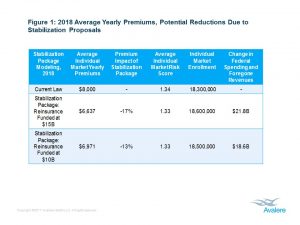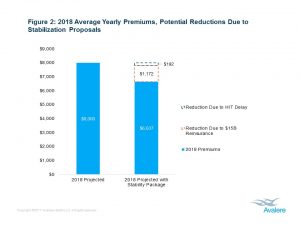| Click HERE and let us show how BHM can economically maintain turn-around times even in the most disruptive political environments. |
 America’s Health Insurance Plans (AHIP) released new research on exchange reinsurance stabilization efforts leading to higher enrollment in exchanges. Funding a $15 billion reinsurance stabilization package, in combination with a delay of the Affordable Care Act’s (ACA’s) health insurance tax (HIT) through the end of 2018 and guaranteeing funding of cost-sharing reductions (CSRs), could reduce average yearly premiums by $1,363 (a 17% reduction).
America’s Health Insurance Plans (AHIP) released new research on exchange reinsurance stabilization efforts leading to higher enrollment in exchanges. Funding a $15 billion reinsurance stabilization package, in combination with a delay of the Affordable Care Act’s (ACA’s) health insurance tax (HIT) through the end of 2018 and guaranteeing funding of cost-sharing reductions (CSRs), could reduce average yearly premiums by $1,363 (a 17% reduction).
Uncertainty in the individual market, rising premiums, and declining issuer participation have created the need for federal and state policy makers to address these issues to stabilize the marketplace.
To understand which marketplace reforms could have the greatest potential to lower premiums, Avalere (funded by AHIP) analyzed the possible impacts of $10 billion and $15 billion reinsurance stabilization packages in combination with a HIT delay.
Research found funding a $15 billion reinsurance stabilization package would have the greatest impact, decreasing the average yearly individual market premium from $8,000 to $6,637 (17%). This stabilization package could also increase enrollment in the individual market to 18.6 million from the current 18.3 million. Lastly, funding a reinsurance program and decreasing the ACA’s HIT could lead to a $21.8 billion increase in federal spending and foregone revenues.
“Funding a reinsurance program for exchange plans, guaranteeing CSRs, and delaying the health insurance tax could lead to lower premium costs for consumers, while at a higher cost to the federal government,” said Chris Sloan, senior manager at Avalere.
“While many exchange enrollees today are insulated from the expected premium increases for 2018, lowering premiums for the unsubsidized and incenting healthier individuals to sign up may help ensure a healthier market in the long-term.”
 Analysis also found funding reinsurance programs would lead to the greatest savings compared to the delay of the HIT. The research showed that funding a $15 billion reinsurance program would reduce average yearly premiums by $1,172 compared to $192 per year if the HIT was delayed. The ACA created a HIT to be charged to entities that provide health insurance coverage, and the Consolidated Appropriations Act of 2016 suspended the fee for payments due in 2017.
Analysis also found funding reinsurance programs would lead to the greatest savings compared to the delay of the HIT. The research showed that funding a $15 billion reinsurance program would reduce average yearly premiums by $1,172 compared to $192 per year if the HIT was delayed. The ACA created a HIT to be charged to entities that provide health insurance coverage, and the Consolidated Appropriations Act of 2016 suspended the fee for payments due in 2017.
“Providing direct funding for a reinsurance program rather than assessing a fee on health plans like in the ACA’s original reinsurance program would likely provide a simpler approach and better predictability for plans,” said Elizabeth Carpenter, senior vice president at Avalere.
“Creating more certainty for plans could lead to greater marketplace stability and lower premium costs for consumers.” Elizabeth Carpenter, senior vice president at Avalere
Avalere’s report also examined the impacts of guaranteeing funding for cost-sharing reduction payments through 2018 and providing states additional flexibility to manage their individual insurance markets.
Click HERE and let us show how BHM can economically maintain turn-around times even in the most disruptive political environments.






